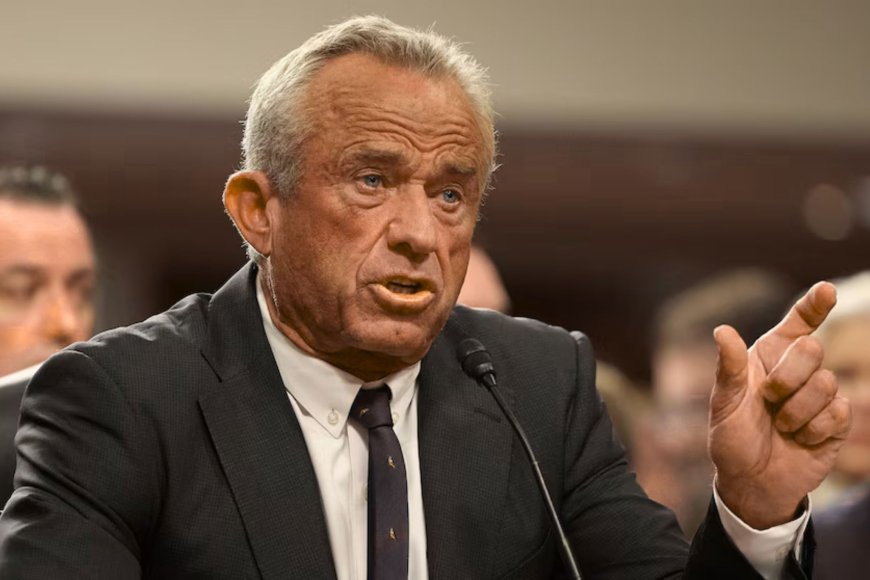RFK Jr. Grilled by Congress Over NIH Cuts, Vaccine Remarks, and DEI Program Elimination
HHS Secretary Robert F. Kennedy Jr. faces intense scrutiny in Congress over $2.7B NIH cuts, vaccine stance, and removal of racial equity programs during 2025 budget hearings.

RFK Jr. Grilled by Congress Over NIH Cuts, Vaccine Remarks, and DEI Program Elimination
Washington, D.C. – May 15, 2025 — U.S. Health and Human Services Secretary Robert F. Kennedy Jr. faced intense scrutiny from lawmakers on Wednesday as he defended controversial budget cuts, his personal views on vaccination, and the rollback of equity programs during two high-profile congressional hearings.
Appearing first before the House Appropriations Subcommittee on Labor, Health and Human Services, and Education, Kennedy was repeatedly questioned about deep staffing cuts and funding reductions across health agencies. Lawmakers expressed alarm over a Senate report revealing that more than $2.7 billion in National Institutes of Health (NIH) research grants had been canceled — a figure significantly higher than previously estimated.
Kennedy insisted that the cuts were part of efforts to streamline the agency and eliminate redundant operations, though he acknowledged that some decisions were led by the newly created Department of Government Efficiency. “There were many instances where I said, ‘That would hurt us,’” Kennedy told the committee. He also emphasized that he would spend whatever funds Congress legally appropriates.
During the same hearing, Rep. Mark Pocan (D-Wis.) pressed Kennedy on his views about vaccines. Kennedy responded, “My opinions on vaccines are irrelevant. Everybody should make that decision. I don’t think people should be taking medical advice from me.” He added that he would likely vaccinate his children against measles but hesitated to answer questions about other vaccines such as chickenpox and polio.
In the afternoon, Kennedy appeared before the Senate Health, Education, Labor, and Pensions Committee, where lawmakers confronted him over the removal of diversity, equity, and inclusion (DEI) programs. Rep. Bonnie Watson Coleman (D-N.J.) accused the administration of “a crusade” against equity efforts and said that grant applications containing words like “race,” “bias,” or “disparity” were being censored.
“How exactly will banning the words that we use to describe ourselves make us healthier?” she asked.
Kennedy responded that the Trump administration is aiming for a “colorblind” approach to governance, though he offered no specific justification for the elimination of LIHEAP — a federal program that helps low-income households with heating and cooling bills. He did say that $400 million in LIHEAP funds had already been distributed in recent months and that Congress is free to appropriate additional funding if necessary.
Questions about staffing at the Centers for Disease Control and Prevention (CDC) followed, with specific concern over the elimination of the lead poisoning prevention program. Sen. Tammy Baldwin (D-Wis.) asked whether Kennedy intended to shut the program down. He responded, “No, we do not,” indicating that it may have been cut in error. However, HHS has yet to rehire the staff or reinstate the program under its original structure.
Dr. Eric Svendsen, former director of the now-disbanded division, confirmed that no employees had been brought back and that the program remains inactive.
Kennedy said that some positions had been restored at the National Institute for Occupational Safety and Health (NIOSH), particularly in West Virginia and Pennsylvania. However, other regional offices, including one in Spokane, Washington, have not been reinstated. Some workers at the Food and Drug Administration (FDA), including staff involved in food safety and transparency, also had their layoffs reversed.
The Senate hearing was briefly interrupted by protesters yelling slogans such as “RFK kills people with AIDS” and “Anti-science, Anti-American.” Some audience members wore protest stickers throughout the session, visibly criticizing the secretary’s leadership and past public health statements.
Kennedy concluded his testimony by stating that agency reorganizations are part of a larger effort to improve performance and eliminate waste. “If it doesn’t happen, then Congress is welcome — and they should — appropriate the money,” he said. “And I will spend it.”























